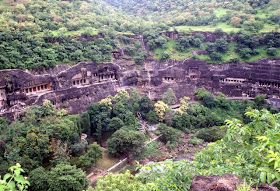Saturday, May 21, 2011
Ellora Caves-India
he Ellora Caves ,Ellora is an archaeological site, 30 km (19 mi) from the city of Aurangabad in the Indian state of Maharashtra built by the Rashtrakuta rulers. Well-known for its monumental caves, Ellora is a World Heritage Site. Ellora represents the epitome of Indian rock-cut architecture. The 34 "caves" – actually structures excavated out of the vertical face of the Charanandri hills – being Buddhist, Hindu and Jain rock cut temples and monasteries, were built between the 5th century and 10th century. The 12 Buddhist (caves 1–12), 17 Hindu (caves 13–29) and 5 Jain (caves 30–34) caves, built in proximity, demonstrate the religious harmony prevalent during this period of Indian history.The caves at Ellora were carved out of the vertical face of the Charanandri hills between the 6th and 10th centuries. The carving work began around 550 AD, about the same time the Ajanta Caves (100km northeast) were abandoned.
The Ellora Caves were built at time when Buddhism was declining in India and Hinduism was beginning to reassert itself. The Brahmanical movement was especially powerful under the patronage of the Chalukya and Rashtrakuta kings, who oversaw most of the work at Ellora – including the magnificent Kailasa Temple built in the 700s.
The last period of building activity took place in the 10th century, when the local rulers switched allegiance from Shaivism (Hinduism devoted to Shiva) to the Digambara sect of Jainism.
The coexistence of structures from three different religions serve as a splendid visual representation of the prevalent religious tolerance of India. For this reason and others, the Ellora Caves were designated a UNESCO World Heritage Site in 1983.The Buddhist caves (also called Vishvakarma caves) are the earliest of the Ellora Caves, dating from 500 to 750 AD. All except Cave 10 are viharas (monasteries), which were used for study, meditation, communal rituals, eating and sleeping.
The caves become steadily larger and more elaborately decorated as they progress to the north, which scholars have explained by the growing need to compete with Hinduism for patronage. The earliest Hindu caves at Ellora date from 600 AD, right in the middle of the Buddhist period.
Listing of Caves
Buddhist Caves: 5 th century to 7 th century AD
Caves 1 to 12 at the southern end
Hindu Caves: 8 th century to 10 th century AD
Caves 13 to 29 in the middle
Jain Caves: 9 th century to 11 th century AD
Caves 30 to 34 at the northern end





No comments:
Post a Comment